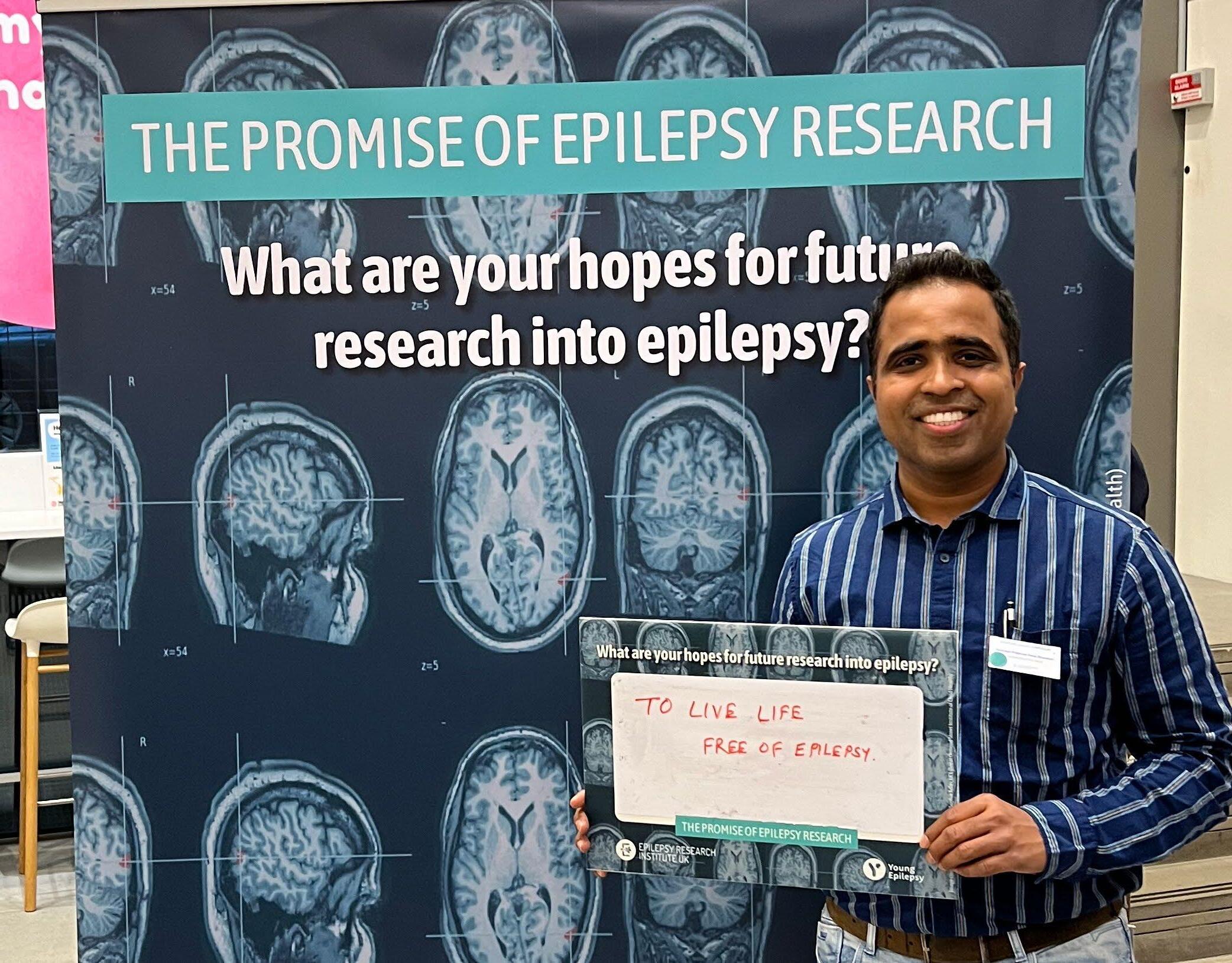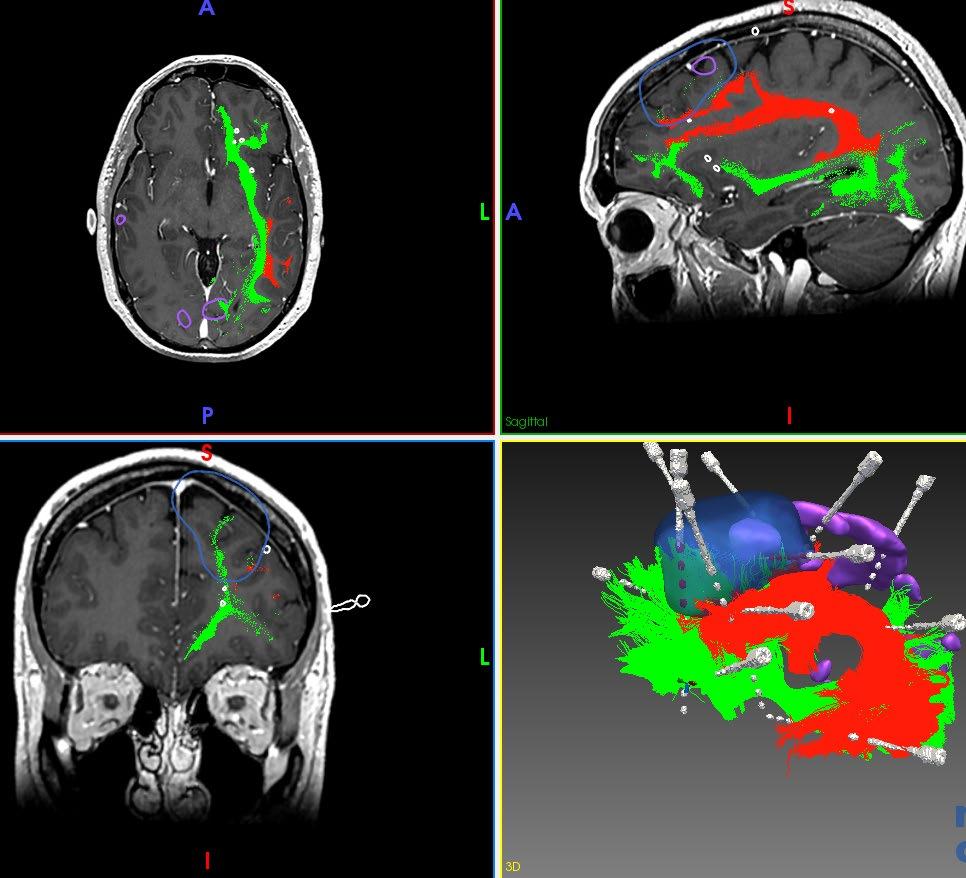






We stand on the brink of a new era in epilepsy research. The scientific breakthroughs emerging today offer unprecedented opportunities to improve the lives of the 630,000 people living with epilepsy in the UK1, and millions more worldwide2. Now is the time to seize this momentum, drive progress, and transform our vision into reality. This strategy demonstrates our pathway to achieving this ambition.
OUR VISION, MISSION & VALUES
Vision: A life free from epilepsy
Mission: To radically advance research into epilepsy
Core Values: Integrity, collaboration, honesty, innovation, and diversity & inclusion
Grounded in the James Lind Alliance prioritysetting methodology3 and with robust support from our epilepsy research community, our strategy will significantly amplify the Institute’s research capabilities. Now is the time to take advantage of the rapid advances in epilepsy research to help ensure that outcomes are meaningful, accessible, and translatable into clinical practice. Our research model, built around six key themes, is already guiding national and global efforts to transform the landscape of epilepsy research, and we plan to build on this strong foundation.
With epilepsy accounting for three deaths per day4 , and 1% of all NHS costs annually5, urgent action is required. The total cost of the condition to the UK economy is far in excess of £2 billion per year6 , underscoring the need for epilepsy research as a national priority.
In 2022, the World Health Organisation (WHO) issued its ten-year ‘Intersectoral Global Plan’ (IGAP)7 for epilepsy and other neurological disorders, urging governments, funders, and researchers to work together to improve the lives of those affected by
these conditions. The Epilepsy Research Institute aligns closely with these priorities, positioning the UK as a leader in addressing this urgent call to action.
With the landscape of epilepsy research evolving rapidly, our approach is dynamic. This allows us to take advantage of new opportunities while remaining focused on our core mission. Backed by a strong foundation in excellence and integrity, we are committed to building a sustainable, equitable future for the epilepsy community—both in the UK and worldwide.
The implementation of this strategy will require a comprehensive and focused approach. As such, it is structured around our three key strategic goals, which serve as the foundation for growth, impact, and sustainability. These are as follows:
• Advancing Research Operations: We will foster innovation, stimulate collaboration, and drive impactful outcomes by strengthening our research infrastructure and expanding our national and global partnerships to position ourselves at the forefront of the UK Epilepsy Research community.
• Increasing Awareness: We will raise public awareness of epilepsy to drive funding and policy change whilst also reducing stigma. This will include awareness campaigns, lobbying and engagement with MPs and other key decision-
makers, and collaboration with charities and researchers.
• Driving Strategic Investment and Fundraising: Based on robust planning, through the combination of targeted fundraising, securing research investment and the evidenced leverage gained by our research, we intend to secure circa £110 million by 2030.
The Epilepsy Research Institute will lead the transformation of epilepsy research. With a clear vision and structured approach, we will drive meaningful advancements that radically improve lives.
Guided by the informed research priorities of our six themes, the additional funding secured will be utilised to maintain momentum, scientific innovation and translation of research findings.
Together with people affected by epilepsy—as well as our partners, researchers, and supporters—we are confident this strategic plan will accelerate progress towards our ultimate vision of a life free from epilepsy, and a world where epilepsy no longer limits lives.
OUR VISION
OUR MISSION
To radically advance research into epilepsy
OUR VALUES
INTEGRITY
COLLABORATIVE
We are open and transparent about all aspects of our work and employ the upmost candour in our focus to ‘radically advance research into epilepsy’.
We appreciate that it is only by working together we will achieve our vision of ‘a life free from epilepsy’. Our teamwork and partnerships reflect our integrity, professional approach and trustworthiness.
HONESTY
INNOVATIVE
DIVERSITY & INCLUSION
We expect a high standard of excellence, supporting the best science with our systematic and rigorous approach to all of our work.
We are courageous and ambitious to enable ground-breaking research and welcome innovative and creative ideas.
We are respectful of all the people working with, and for us, including people living with epilepsy, researchers, collaborators and our supporters, fostering teams across diverse cultures and backgrounds and valuing their views and input.
At the
Epilepsy Research Institute,
our mission is to ‘radically advance research into epilepsy’ and achieve our vision of ‘a life free from epilepsy’.
In Autumn 2023, we were awarded Institute status by the UK government, marking a pivotal milestone in our journey. Over the past year, we have leveraged this status to build the foundations needed to drive forward our ambitious research agenda. This has involved uniting the whole epilepsy-focused community into a cohesive and collaborative network. The strength of this network over the next five years is essential to deliver tangible progress. It also demonstrates the real-world impact of our work which is urgently needed by the whole epilepsy community.
Our 5-Year Strategy (2025–2030) sets out the decisive steps we will take to accelerate discovery, foster collaboration, drive investment, and translate research into positive outcomes for the one in 100 people living with epilepsy. Grounded in the priorities identified by the epilepsy community through the robust James Lind Alliance priority-setting methodology3, this strategy will significantly enhance our research capabilities, ensuring that outcomes are meaningful, accessible, and translatable into clinical practice. Our research model, built around the six key themes described later in this document, is already guiding national and global efforts to transform the landscape of epilepsy research, and we plan to build on this strong foundation.
Backed by a network of leading experts across the UK and international partners spanning clinical and research fields, we are poised to fast-track innovation, prevention, and the development of lifechanging treatments. Through strategic investment, partnerships, and advocacy, we are committed to ensuring that epilepsy research receives the attention it deserves.
We stand on the brink of a new era in epilepsy research. The scientific breakthroughs emerging today present unprecedented opportunities to improve the lives of the 630,000 living with the condition in the UK1, and millions more worldwide2 An example being the development of genetic testing for rare epilepsies which has led to precision medicine approaches. These advances highlight that both prevention and a life free from epilepsy are possible.
Now is the time to seize the momentum of such advances, to drive progress, and transform our vision into reality. This strategy demonstrates our pathway to achieving that goal.
Our vision is to drive transformative progress in epilepsy research across the UK—advancing understanding, revolutionising treatment, and achieving a future free from epilepsy. Through innovation, collaboration, and inclusivity, we aim to accelerate the discovery of groundbreaking therapies which are personalised to the needs of individuals living with the condition.
Our goal is to ensure that no one is left behind, not only advancing scientific knowledge but also improving the quality of life for people directly affected by epilepsy and their families. By investing in cutting-edge technologies, fostering cross-disciplinary partnerships, and embedding a strong patient and public involvement (PPI) approach, we will help shape a future where epilepsy is no longer a barrier to living a full and healthy life. It is vital that every person with epilepsy has access to the most effective treatments and care.
Epilepsy affects over 630,000 people in the UK, with over 29,000 being newly diagnosed each year1. There are also three lives lost every day due to epilepsyrelated deaths4— a mortality rate higher than some other developed nations.
Every year the condition drives 100,000 UK hospital visits8 and accounts for 1% of all NHS costs5, yet stark health inequalities continue to prevent many from accessing timely support. As the Government sets about reforming the NHS, this cost is something that must be urgently addressed.
In addition to the direct impact of epilepsy itself, people with the condition also have a significantly
increased risk of experiencing mental ill health9,10. However, the impact extends far beyond physcial and mental healthcare. Epilepsy disrupts education, limits employment opportunities, and places immense strain on carers. The total economic burden of epilepsy is far in excess of £2 billion per year6. Idiopathic epilepsy alone costs the UK £1.7 billion annually (0.07% of the UK’s 2019 GDP)11, with lost productivity accounting for more than half of this cost. Given its wide-reaching consequences, epilepsy research must therefore be a national priority.
Worldwide, over 50 million people live with epilepsy, with nearly 80% of reported cases being in lowand middle-income countries2 where inadequate healthcare leads to higher mortality rates12 Recognising this global challenge, the World Health Organisation (WHO) issued a bold call to action with its ten-year ‘Intersectoral Global Plan’ (IGAP) for epilepsy and other neurological disorders7. This important plan urges governments, funders, and researchers to work together to improve the lives of those with these conditions. As populations around the globe continue to age, there will also emerge various challenges and opportunities relating to the delivery of optimal epilepsy healthcare to senior citizens who are at increased risk of a first diagnosis10.

The goals identified within the Institute’s strategy align closely with those of IGAP, building on the UK’s position as a leader providing world class epilepsy research, to address this urgent call to action.
The landscape of epilepsy research is evolving rapidly, and our Institute’s dynamic strategy is designed such that we can seize new opportunities while remaining focused on our core mission. Backed by a strong foundation in excellence and integrity, we are committed to building a sustainable, equitable future for the epilepsy community—both in the UK and worldwide.
The past year has been pivotal in laying the groundwork, meaning the Institute is now uniquely positioned to harness the momentum of this new era. Advances in scientific discovery, technology, and
therapeutics have brought us to a defining moment— one where we have the potential to fundamentally change the trajectory of epilepsy research and treatment.
By strategically focusing the combined strength of the world-class researchers and scientists that the Institute has brought together, we will strengthen partnerships, engage communities, and advocate for research-driven policies. Through this unique network, we are confident we can drive the next generation of breakthroughs. Our strategic framework is designed to fuel innovation, secure long-term investment, and ensure the Institute’s impact remains meaningful, measurable, and enduring.
Together, we have the power to shape a future where epilepsy no longer limits lives.

The implementation of this strategy will require a comprehensive and focused approach. As such, our plan is structured around our three key strategic goals, which serve as the foundation for growth, impact, and sustainability. These are as follows:
DRIVING STRATEGIC INVESTMENT AND FUNDRAISING
INCREASING AWARENESS
As the only epilepsy research institute in the UK, our vision is to drive transformative change, with research operations designed to foster innovation, collaboration, and impactful outcomes. We aim to strengthen our research infrastructure, expand our partnerships both nationally and globally, and accelerate the translation of scientific discoveries into real-world applications.
By leveraging cutting-edge technologies, cultivating cross-sector collaborations, and nurturing a diverse research ecosystem, we will position ourselves at the forefront of the UK epilepsy research community. Our overarching goal is to improve the lives of individuals living with epilepsy and advance knowledge through the creation of strong partnerships across international borders. This strategy outlines our approach to amplifying our impact, ensuring that our work not only addresses national challenges but also contributes to global progress in addressing our mission to radically advance research into epilepsy.
We will achieve this by:
• Expanding the reach and influence of the Institute so by 2030 we are recognised as the leading coordinator of epilepsy research in the UK, as well as spearheading the nation’s research response to IGAP, establishing ourselves as a key player globally for advancing research.
• Building capacity and fostering collaborations by increasing the number of epilepsy-focused PhD students and researchers who remain in science beyond the postdoctoral level by 2030, as well as strengthening partnerships with academia, the NHS, industry, funders, policymakers and people affected by epilepsy.
• Strengthening and developing new international partnerships to share best practice, enhance research translation into clinical practice across diverse communities, and improve coordinated action at the country level in line with IGAP recommendations.
• Ensuring the voices of the one in 100 people affected by epilepsy are heard and acted upon in shaping all our research activities. This will be achieved by expanding and strengthening the patient and public involvement (PPI) work of our Shape Network13, including overseas.
• Advancing the use of new diagnostics, technology, and AI to ensure the benefits of these fast-growing markets are harnessed for people with epilepsy, through innovative research projects and the UK being recognised as a leader in clinical and translational research for neurotechnology.
• Addressing diversity and inequalities by promoting equitable access to opportunities to undertake and/or participate in research studies/clinical trials. This will help generate empirical findings that are inclusive, representative, and applicable to all populations.
• Understanding the impact of the comorbidities experienced by people living with epilepsy and drawing on the insights that are emerging from epilepsy-adjacent research fields (e.g., overall brain health) to ensure that we are taking a whole-person approach and epilepsy is recognised as a neuroscience priority by bodies such as Wellcome and NIHR.
All of the above objectives will be underpinned by the continuing impactful work of our research programme across six key research themes, each of which is led and supported by both well-established and early career researchers.






Further details of the exciting work of each of these themes, along with the details of their ambitions, can be found in the Institute’s Research Roadmap document14. Their core aims are provided in the box below.
Aim: To drive novel multidisciplinary research into the causes of epilepsy and its lifelong relationships with neurodevelopment conditions, accelerating the development of interventions and improving the quality of life for all affected.
2. Advanced Therapeutics & Disease Modification
Aim: To facilitate and enable the development of innovative therapies and interventions across the translational pipeline for the treatment and prevention of epilepsy.
3. Mortality, Morbidity & Risk
Aim: To accelerate research through multidisciplinary approaches to identify risk factors, reduce morbidity and prevent epilepsy-related deaths.
4. Reproduction & Hormones
Aim: To advance and accelerate research into the study of reproductive health and hormones in epilepsy across the lifespan, working across the translational pipeline to deliver impactful patient benefits.
5. Enabling Technologies
Aim: To leverage emerging technologies and foster collaborations that can enhance innovation and accelerate patient benefits in ways that extend beyond the existing research and clinical landscape.
6. Capacity Building
Aim: To transform the epilepsy research ecosystem in the UK and internationally through informed, strategic interventions to elevate and expand multidisciplinary networks, generate opportunities, and foster a progressive and inclusive research culture.
Raising awareness of the urgent need to fund research into the causes, prevention, and treatment of epilepsy is critical to achieving the Institute’s mission. Public understanding of epilepsy remains limited and this lack of awareness directly impacts funding, policy decisions, and research advancements. By increasing visibility and engagement, we can drive greater investment, strengthen advocacy efforts, and inspire the collaborations necessary to accelerate scientific progress.
To make a lasting impact, we must engage a broad range of stakeholders—including the general public, policymakers, researchers, healthcare professionals, and potential funders. Only through collective action can we ensure epilepsy research receives the priority and investment it deserves.
We will achieve this by:
Delivering powerful awareness campaigns using clear, engaging content, to inform people about the condition and inspire action on, and support for, epilepsy research.
Engaging Members of Parliament and lobbying for policy changes by building coalitions, running advocacy campaigns, and aligning efforts with government priorities like NHS reform and health equity.
Expanding the Shape Network and fostering collaborations with charities and supporters to create a vibrant, patient-focused community
that amplifies awareness in the UK and with international partners.
Supporting the epilepsy research community through the delivery of conferences, events, and networking opportunities to increase collaboration by retaining and growing our impactful network of scientific talent.
Enhancing understanding of the interrelationship between epilepsy and the holistic health and wellbeing of individuals and their carers, including its impact on mental health, physical wellbeing, and life opportunities.
By raising awareness, we will not only increase funding and policy support but also challenge misconceptions and reduce the stigma surrounding epilepsy. Greater public engagement will drive momentum for change, ensuring epilepsy research is recognised as a priority both in the UK and around the globe. Through this strategic focus, we will build a movement which transforms understanding, drives investment, and ultimately leads to breakthroughs that tangibly improve lives.
Research into epilepsy remains starkly underfunded, despite the significant burden epilepsy places on individuals, families, and healthcare systems. Addressing this historic underinvestment is critical to accelerating discoveries that will lead to better diagnosis, more effective treatments and increased prevention.
Based on robust planning, we have set an ambitious target of securing circa £110 million over the next five years, with these funds being used to radically advance epilepsy research. This includes growing our internal grants programme, continuing to benefit from our established leverage on research funding, targeted fundraising, new funding collaborations, and strengthened partnerships enabled by the Institute.
We will achieve this by:
Elevating epilepsy as a research and funding priority by actively engaging with decisionmakers, funders, and industry leaders to highlight the societal impact of epilepsy and the urgent need for increased research investment.
Expanding and diversifying the Institute’s funding streams by seeking to secure funding through grant applications, philanthropic foundations, corporate partnerships, and inward investment.
Increasing donor engagement and public support through compelling storytelling, targeted appeals, and awareness campaigns, to expand our donor base, drive fundraising
events, promote legacy giving and in-memory donations, and mobilise epilepsy communities.
Building long-term alliances for sustainable investment by forging strong partnerships with public and private sectors, research institutions, and donors to ensure sustained and meaningful investment in epilepsy research.
Facilitating large-scale research collaborations by coordinating multi-site and crossinstitutional projects, strengthening partnerships, streamlining resources, and enhancing impact.
£5.41
Every £1 invested in research by the Epilepsy Research Institute leverages a further £5.41 in follow-on funding.
To ensure the effective implementation of this strategy and to measure its success, we will embed a rigorous monitoring and evaluation framework across all areas of our work. Robust assessment will allow us to track progress, adapt to emerging opportunities, and ensure accountability at every level.
Regular reports will be reviewed by the Board of Trustees and shared with key stakeholders, ensuring transparency and continuous improvement. Additionally, our routine horizon scanning, external audits, and stakeholder feedback will inform adjustments to the strategy, including any legislative changes, allowing us to remain agile and responsive in a rapidly evolving research landscape.

At the Epilepsy Research Institute, we are dedicated to improving the lives of individuals affected by epilepsy, driving transformative change through groundbreaking research, leading to targeted advances in prevention and treatment options. Over the next five years, through the ongoing development of our robust network of renowned, and early career researchers, including international partners, we will continue to strengthen our position as the UK leader of epilepsy research and a key player globally.
The delivery of the Institute’s ambitious five-year strategy, will result in:
• Substantial investment secured to fund cutting-edge research, such as genetic studies, precision medicine, and neurotechnology, and lead to breakthrough epilepsy treatments.
• Increased visibility and public awareness, which has increased the understanding of epilepsy amongst decision makers and influenced government policy.
• Enhanced collaborations with world-class researchers and institutions, which have driven progress in understanding the underlying causes of epilepsy and developing targeted therapies.
• Significant evidence of progress made against the informed priorities for epilepsy research as set by the epilepsy community
Most importantly, the impact of the scientific breakthroughs and enhanced research capabilities enabled through this strategic plan will present unprecedented opportunities to improve the lives of the 630,000 living with the condition in the UK, and millions more worldwide.

The Epilepsy Research Institute is at the forefront of a transformative era in epilepsy research. With a clear vision, mission, and strategic goals, we will drive meaningful advancements that will radically improve the lives of those affected by epilepsy.
Our structured approach, underpinned by robust governance, strategic investment, and strong collaborations, ensures we are well-positioned to deliver on our objectives over the next five years.
Guided by the informed research priorities of our six themes, the additional funding secured through the implementation of this ambitious five-year strategy will be utilised to maintain momentum, scientific innovation and translation of research findings.
All funds secured by the Institute will be carefully invested in delivering this innovative research. This includes relatively small, targeted research pilots, through to international multi-year clinical trials. With the full range of identified priorities already established we are able to be proactive and ready to immediately respond as funding becomes available.
Together with our partners, researchers, supporters, and those living with epilepsy, we are confident this strategic plan will accelerate progress towards our ultimate vision: a life free from epilepsy and a world where epilepsy no longer limits lives.

1. Wigglesworth S, Neligan A, Dickson JM et al. The incidence and prevalence of epilepsy in the United Kingdom 2013–2018: A retrospective cohort study of UK primary care data. Seizure 2023;105:37–42. doi.org/10.1016/j. seizure.2023.01.003
2. World Health Organization. Epilepsy Factsheet, 2024 who.int/news-room/fact-sheets/detail/epilepsy
3. Norton AC, Twohig-Bennett C, Smeaton M et al. Top Ten Epilepsy Research Priorities: A UK Priority Setting Partnership. Seizure 2024;125:152–61. doi.org/10.1016/j.seizure.2024.12.008
4. A) Office for National Statistics. Mortality from epilepsy, 2022. digital.nhs.uk/data-and-information/ publications/statistical/compendium-mortality/current/mortality-from-epilepsy/mortality-from-epilepsydirectly-standardised-rate-all-ages-annual-trend-mfp
B) The Scottish Public Health Observatory. Epilepsy: mortality data, 2024. scotpho.org.uk/health-conditions/ epilepsy/data/mortality/
5. Kotsopoulos IAW, Evers SMAA, Ament AJHA and De Krom MCTFM. Estimating the Costs of Epilepsy: An International Comparison of Epilepsy Cost Studies. Epilepsia 2001;42: 634-640. doi.org/10.1046/j.15281157.2001.18200.x
6. Cockerell OC, Hart YM, Sander JWAS and Shorvon SD. The cost of epilepsy in the United Kingdom: An estimation based on the results of two population-based studies. Epilepsy Research 1994; 18 (3):249-260, doi. org/10.1016/0920-1211(94)90045-0
7. World Health Organization. Intersectoral global action plan on epilepsy and other neurological disorders 2022–2031, 2023. iris.who.int/handle/10665/371495
8. Dixon PA, Kirkham JJ, Marson AG et al. National Audit of Seizure management in Hospitals (NASH): results of the national audit of adult epilepsy in the UK. BMJ Open 2015;5:e007325. doi: 10.1136/ bmjopen-2014-007325
9. Mula M, Kanner AM, Jetté N, Sander JW. Psychiatric comorbidities in people with epilepsy. Neurol Clin Pract 2021;11:e112–20. doi.org/10.1212/CPJ.0000000000000874
10. Johnson EL, Krauss GL, Walker KA et al. Late-onset epilepsy and 25-year cognitive change: The Atherosclerosis Risk in Communities (ARIC) study. Epilepsia 2020;61:1764–73. doi.org/10.1111/epi.16616
11. Economist Impact. The value of action: mitigating the impact of neurological disorders in the United Kingdom. Findings Report, 2024. tinyurl.com/bp9vkjv7
12. Levira F, Thurman D, Sander JW et al. Premature mortality of epilepsy in low- and middle-income countries: A systematic review from the Mortality Task Force of the International League Against Epilepsy. Epilepsia 2017; 58: 6-16. doi.org/10.1111/epi.13603
13. Epilepsy Research Institute. Shape Network PPIE Group, 2019. epilepsy-institute.org.uk/eri/research/ppieshape-network/
14. Epilepsy Research Institute. Research Roadmap 2024 – One Year On, 2024. epilepsy-institute.org.uk/eri/ about-us/publications/

